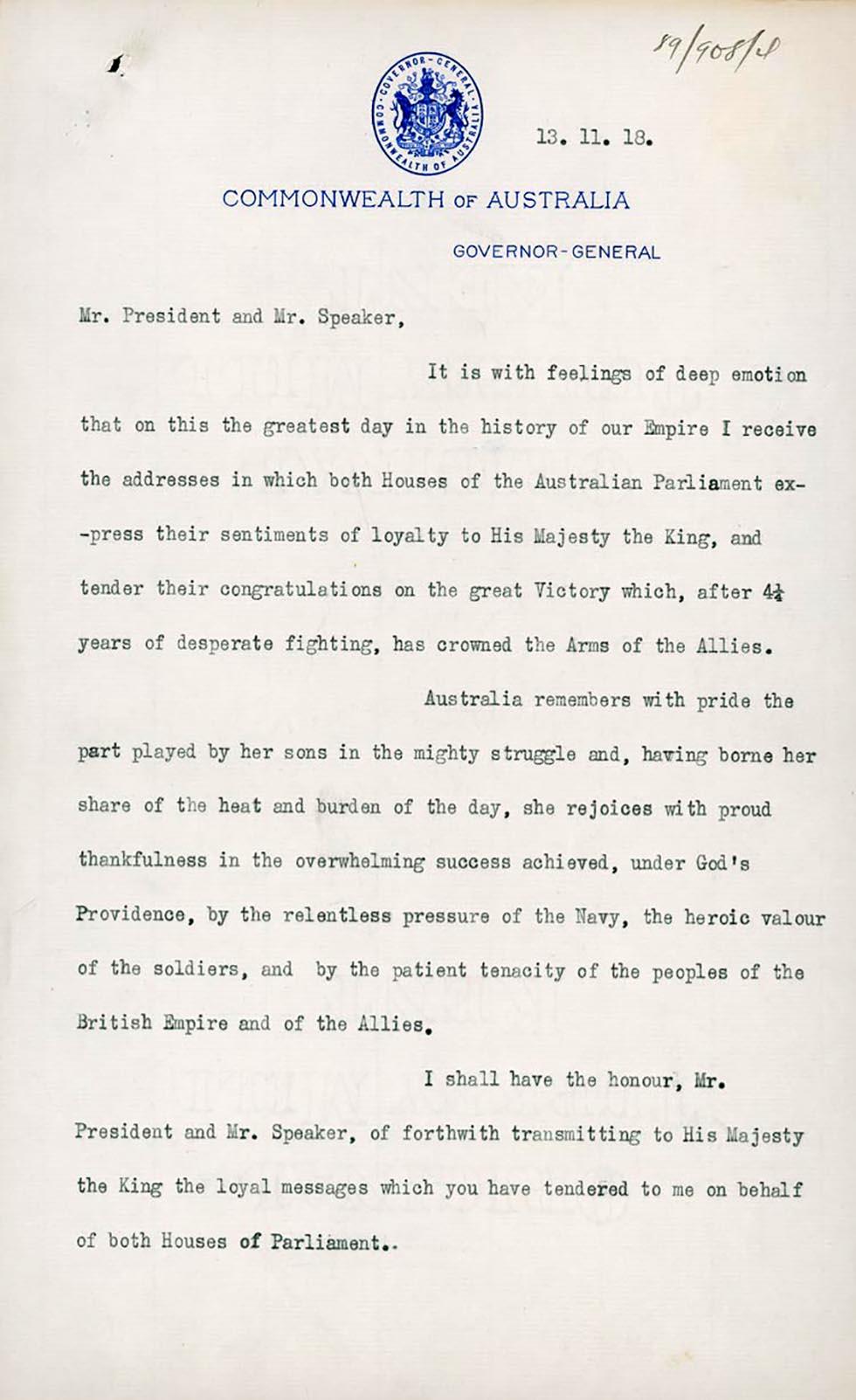


Transcript
[Annotated in pencil in top right corner:] 89/908/4
[Letterhead in blue ink displaying coat of arms of United Kingdom, and the text 'COMMONWEALTH OF AUSTRALIA', 'GOVERNOR-GENERAL'.]
13.11.18
Mr. President and Mr. Speaker,
It is with feelings of deep emotion that on this the greatest day in the history of our Empire I receive the addresses in which both Houses of the Australian Parliament express their sentiments of loyalty to His Majesty the King, and tender their congratulations on the great Victory which, after 4¼ years of desperate fighting, has crowned the Arms of the Allies.
Australia remembers with pride the part played by her sons in the mighty struggle and, having borne her share of the heat and burden of the day, she rejoices with proud thankfulness in the overwhelming success achieved, under God’s Providence, by the relentless pressure of the Navy, the heroic valour of the soldiers, and by the patient tenacity of the peoples of the British Empire and of the Allies.
I shall have the honour, Mr. President and Mr. Speaker, of forthwith transmitting to His Majesty the King the loyal messages which you have tendered to me on behalf of both Houses of Parliament.
About this record
This document is part of a reply dated 13 November 1918 from the Governor-General of Australia Sir Ronald Munro-Ferguson (1860–1934) in which he recognises Australia's pride in 'the part played by her sons' in the struggle to achieve victory in World War I (1914–18). He specifically praises the efforts of the navy, the soldiers and the peoples of the British Empire. It was written in response to addresses of loyalty and congratulations to the King passed by both houses of the Australian Parliament following the armistice ending World War I on 11 November 1918.
Educational value
-
This reply from the Governor-General to the Speaker of the House of Representatives and the President of the Senate was part of the official outpourings of joy at the cessation of hostilities in World War I. On 13 November 1918 the speaker, president and members of both houses gathered on the steps of Parliament House in Melbourne to present the Governor-General with an official address to be sent by cablegram to King George V.
-
Munro-Ferguson's reply encapsulates a particular view of Australia's contribution to the victory – that it was not the contribution of an individual nation but one part of the collective contribution of the British Empire, needing to be considered as a whole, not separately. He does not speak of the role of the Royal Australian Navy (RAN) or of the Australian Imperial Force (AIF), but instead of 'the navy' and 'the soldiers' of the British Empire.
-
The Governor-General's reply contrasted markedly with parliament's address in its view of the reasons for World War I. Munro-Ferguson was silent on the point, describing it solely as a military struggle. The Australian Parliament's address, on the other hand, contained phrases such as 'the triumph of Righteousness over the forces of Evil'. Munro-Ferguson saw the victory as 'crowning the arms of the Allies'. The parliament saw it as securing an honourable peace.
-
The King's response to the cablegram was much more in line with the Australian Parliament's view of the nation's contribution and role in the war than Munro-Ferguson's. King George V thanked the Australian Government and people and spoke of the 'imperishable deeds' and 'undying fame' of the 'brave soldiers and sailors of Australia' who helped 'to win for the free nations of the earth a peace and ordered security'.
-
Australia's contribution to the war effort was enormous – per capita it was the nation's most costly war. From a population of less than 5 million, more than 60,000 Australians died and a further 156,000 were wounded, gassed or captured as prisoners of war. As the largest service the AIF bore the brunt of the casualties, but sailors of the RAN made a significant contribution to the fighting and about 3000 Australian airmen served with the Australian Flying Corps.
-
Munro-Ferguson judged Australian politics and society during World War I first and foremost in terms of the demands of the British Empire's military struggle and these attitudes underpinned his reply. At the time he was Australian governor-general the role was much more that of being the representative of the British monarch than it is today. He was also the representative of the British Government, serving as its de facto ambassador to Australia.
Related themes
Need help with your research?
Learn how to interpret primary sources, use our collection and more.




